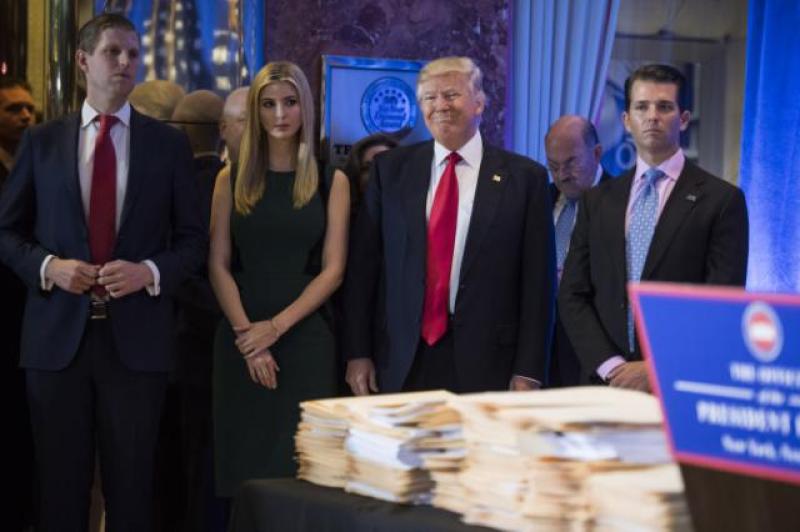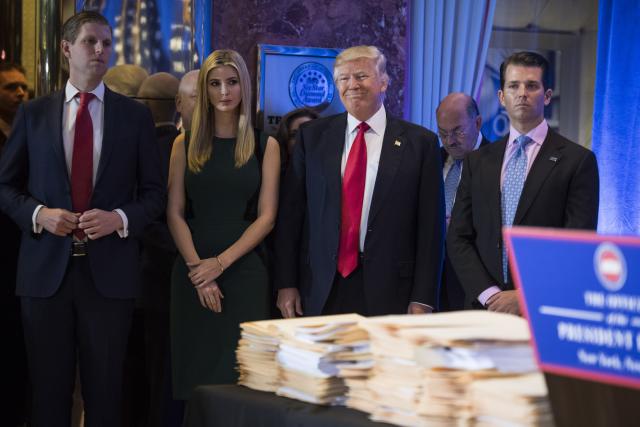The Trump Family Is Trying to Sue Its Way Out of Congressional Oversight


Politics
The Trump Family Is Trying to Sue Its Way Out of Congressional Oversight
 The White House has concocted an ambitious plan for pretending checks and balances don’t exist.
The White House has concocted an ambitious plan for pretending checks and balances don’t exist.Save for hearing his name uttered aloud by a cable news host, there is nothing that perpetually aggrieved president Donald Trump loves more in this world than filing a lawsuit. It is for this reason that on Monday he sued Deutsche Bank and Capital One—which received subpoenas from House Democratic leadership last week for the Trump family's financial records since 2010—in a preemptive effort to prevent the banking giants from furnishing the requested information to Congress.
The suit's plaintiffs include the three eldest Trump children, a bevy of Trump family businesses, and the president himself, but "solely in his capacity as a private citizen." (The complaint also identifies Ivanka as "the daughter of President Trump," conveniently eliding the fact that she is also a government employee and senior White House adviser.) Its principal theory is that the congressional subpoenas are invalid because they do not relate to a proper "legislative purpose," and thus have no purpose "other than a political one"—that is, that they are intended solely to "inflict maximum political damage."
Members of Congress, of course, are perfectly aware of the need to establish a link between a given subpoena and their task of legislating. As the complaint concedes, House Intelligence Committee chair Adam Schiff and House Financial Services Committee chair Maxine Waters specified that they intend their subpoenas to investigate "potential foreign influence on the U.S. political process" and the use of the financial system for "illicit purposes."
If, hypothetically speaking, the records in question would yield information about the Trump family's business interests in Russia during the 2016 campaign, or the president's well-established practice of committing tax fraud , that information would be relevant to matters within the committees' respective jurisdictions. A 1927 Supreme Court opinion sensibly declared that as long as Congress is dealing with a subject area in which it has the power to legislate, it has broad authority to conduct investigations to elicit information that would be helpful to that effort.
Yet the complaint argues that the legislative branch's oversight of the executive branch's conduct—a foundational aspect of our system of checks and balances—amounts to an unconstitutional assumption of law enforcement or judicial powers.
A week ago, employing similarly tortured logic, Trump sued House Oversight Committee chair Elijah Cummings over a subpoena of the president's accounting firm, alleging the existence of a secret "all-out political war" against President Trump. (In a perfectly Trumpian touch, the suit also asks the court to require Cummings to pay Trump's legal fees, as if a 12-term United States congressman were a Queens sheet-metal vendor with whom Trump had a billings dispute in 1983.) For the next year and a half, the White House apparently plans to deal with any efforts to investigate the president's potential misconduct by burying House leadership in court filings and paperwork.
Trump's legal theories are novel, but his strategy here is not. The family has a long and proud history of litigiousness that careens between greedily petty and frivolously absurd (suing a small Internet marketing firm called "Trump Your Competition" on the grounds that they were profiting off his name and likeness). In 2017, USA Today surveyed the dockets of five other well-known real estate developers and found that Trump and his business interests had been involved in more lawsuits than all of them combined.
In fact, this is not the first time the president has sued Deutsche Bank, or even the silliest grounds on which he dragged them into court. In 2008, when the bank sued him over a $40 million debt, Trump counter-sued , ambitiously claiming that the contemporaneous economic crisis was an act of God—this is a real thing he argued, not a joke—which eliminated his contractual obligation to repay the loan. Because Deutsche Bank had played a role in facilitating the global financial meltdown, he added, it should pay him $3 million for his troubles.
This is roughly the equivalent of a semi truck running over someone in a crosswalk and demanding compensation for the ensuing damage to the paint job. It also sort of worked. The two parties ended up settling their differences, and incredibly, Deutsche Bank thereafter kept lending hundreds of millions of dollars to Trump, for reasons known only to them and hopefully a team of federal law enforcement officials, somewhere, in some capacity.
With this new lawsuit, Trump's objective is less to establish new parameters of congressional power than it is to run out the clock; lawsuits mean courts, courts mean delays, and delays might allow him to get re-elected before facts come to light that might threaten his candidacy. Treasury Secretary Steven Mnuchin has already blown off one deadline to provide Trump's tax returns to the House Ways & Means Committee, and appears poised to officially reject the request altogether next week.
The administration has stonewalled in response to congressional inquiries into the West Wing's broken and nepotistic system for distributing security clearances. And last week, it announced that senior White House white nationalist Stephen Miller would not testify voluntarily before Cummings's House Oversight Committee, forcing the chair to decide whether to issue a subpoena—which would, of course, also immediately end up before a federal judge.
Many Democratic candidates campaigned in 2018 on the promise to act as a meaningful check on Trump, and with the gavel now comfortably in Nancy Pelosi's hand, it makes sense for them to try fulfilling that pledge through the conventional means. But America has never had a president quite like Trump, who has no interest in abiding by constitutional norms and is evidently content to respond with the legalese equivalent of "nah" every time he receives a subpoena between now and November 2020. Should this pattern continue, Congress's constitutionally enshrined power to impeach—about which there exists no arcane legal issue Trump could quibble with in court—may be the only way left for them to hold this president accountable.
Tags
Who is online
69 visitors

With this new lawsuit, Trump's objective is less to establish new parameters of congressional power than it is to run out the clock; lawsuits mean courts, courts mean delays, and delays might allow him to get re-elected before facts come to light that might threaten his candidacy. Treasury Secretary Steven Mnuchin has already blown off one deadline to provide Trump's tax returns to the House Ways & Means Committee, and appears poised to officially reject the request altogether next week.
[Deleted]
https://www.facebook.com/JohnBridevauxSpeaks/photos/a.727276284109933/1181216658715891/?type=3&eid=ARDPiIOP92-XbGiAtbpMglmKLWLwesIPVFKRU8TQIAcPse-5nBCt0GUSxwu4JVp7Uif3Lfk5DLTVmC8A&__xts__%5B0%5D=68.ARBERtsYcKPbVYIEwozynOOUS95paC9vmTPoCJYtX7Sp8c-IriUQkztDg7t1oVTlV2Qv2bGPe5K2cuz9wIcHydzLwlOkhMVVY2bHXIBkQnq2Qoes0u5kBM3ygfu76V3jv2jx7tzAsXVXZVHnKroLSslxljHo7wsfn-Zjm7ggry0vSqkBbEiGiLuxd3F3a-31ESs-QS438HlAaskzloNZ2R40UuBFF6LX0VbxqnHg_ojP9qu8r2if7RC5c5AVozO59hoVlF0g8f-PaqbRZJViSQj8fMhKXyOWbyXS5VD2BgA6xKq46_3LPh7r45byaBQsMudf8YgdyFbDF5cl-4rJE_XZqg&__tn__=EEHH-R
America's Crime Family
If Mario Puzo were still alive, I'd bet he would have a book to write about this family.
The Godfather was based on Pope Alexander VI - Rodrigo Borgia and his family - who he deemed - The first crime family.
Didn't trump inc. do this before?
I though the had a history of suing the little guy, vendors that he didn't pay. Then the small guy doesn't have the money to continue with the assaults.
What is this word, "oversight"?
Don't ask me. I thought I knew what "transparency" meant.
Wasn't "transparency" what they had back in the days of Kodachrome? They used a projector to show the image on a screen.
Right?
FACT CHECK: HAS TRUMP BEEN IN THOUSANDS OF LAWSUITS?
5:22 PM 01/16/2018
California Attorney General Xavier Becerra claimed on “Fox News Sunday” that President Donald Trump has been involved in thousands of lawsuits.
Verdict: True
Analyses of court records confirm that Trump or his companies have been named in thousands of lawsuits.
Fact Check:
California filed over 20 lawsuits against the Trump administration in 2017 over issues ranging from Obamacare to environmental regulations. Becerra, who has led many of these suits, scored a recent win by obtaining a temporary halt on the Trump administration’s decision to end DACA. Discussing this victory, Becerra claimed that Trump has been party to “thousands” of lawsuits.
“Clearly, the President has continued to be arbitrary and capricious in the way he’s tried to undo things,” Becerra said. “And that’s why, as I said before, we haven’t lost a case yet against Donald Trump, a guy who should know how to operate in the courts since he’s been sued or sued himself thousands of times.”
An ongoing investigation by USA TODAY has so far identified over 4,000 lawsuitsdating back to the ’70s in public court records. Other top real estate magnates have been involved in far fewer suits according to the news outlet.
An April 2016 analysis by Bloomberg similarly identified at least 1,300 Trump-related lawsuits since 2000 alone.
Many lawsuits involving Trump were related to his gambling ventures. USA TODAY uncovered about 1,600 lawsuits that stem from Trump-connected casinos going after gamblers who had failed to pay their debts, in addition to numerous suits from casino patrons with personal injury claims.
Trump has a reputation for litigation, and Trump or his companies have filed lawsuits against a variety of parties such as local governments, a beauty queenand media outlets.
Trump in 2015, for instance, filed a $100 million lawsuit against Palm Beach County, Florida for allegedly directing noisy air traffic over his Mar-a-Lago resort on purpose. (The lawsuit, dropped after Trump won the presidential election, was not the first time Trump had sued the county.)
Trump has also utilized the threat of lawsuits for more political purposes. He threatened to sue then-presidential candidate Sen. Ted Cruz during the Republican primaries for running allegedly false ads, and recently threatened to sue the publisher of Michael Wolff’s “Fire And Fury” for defamation.
Some commentators have attributed Trump’s litigious conduct to his mentor, Roy Cohn, an attorney who advised former Sen. Joseph McCarthy’s infamous anti-communist probes. “Roy Cohn taught Donald how to come out punching, how to use lawsuits like machine gun bullets, and take a no-prisoners approach to city hall, to your business opponents, to anyone else who might get in your way,” “TrumpNation” author Timothy O’Brien told PBS’s “Frontline.”
But despite Trump’s reputation for suing others, Trump and his companies have themselves been sued many times, including high-profile lawsuits over Trump University, employee salary disputes and defamation.
A Jamaican model, for instance, sued Trump Model Management in 2014 for allegedly withholding hundreds of thousands in promised wages from her. A Trump lawyer called the claims “frivolous and bogus.”
Lawsuits against Trump have extended beyond just his business dealings. Three protesters sued Trump in 2016 for allegedly inciting violence against them by repeatedly calling to “get them out” of a Kentucky campaign rally.
Analyses by Bloomberg and USA TODAY, however, differ over whether Trump sues or gets sued more often.
USA TODAY’s findings indicate that Trump sues slightly more than he gets sued as a proportion of all identified lawsuits.
Bloomberg, on the other hand, filtered out unremarkable lawsuits related to Trump – such as personal injury complaints – from its initial tally of 1,300. It found about 200 noteworthy lawsuits, and Trump or his companies were the defendant in almost 70 percent of those cases.
As Becerra makes clear, the litigation against Trump has not ceased after he entered the White House. Trump or the Trump administration were sued over 60 times in federal court during the first three weeks of his presidency alone, a figure that does not include lawsuits filed in state and local courts.
“I hate lawsuits and depositions, but the fact is that if you’re right, you’ve got to take a stand, or people will walk all over you,” Trump and journalist Tony Schwartz write in “Trump: The Art Of The Deal.” “Nowadays, if your name is Donald Trump, everyone in the world seems to want to sue you.”